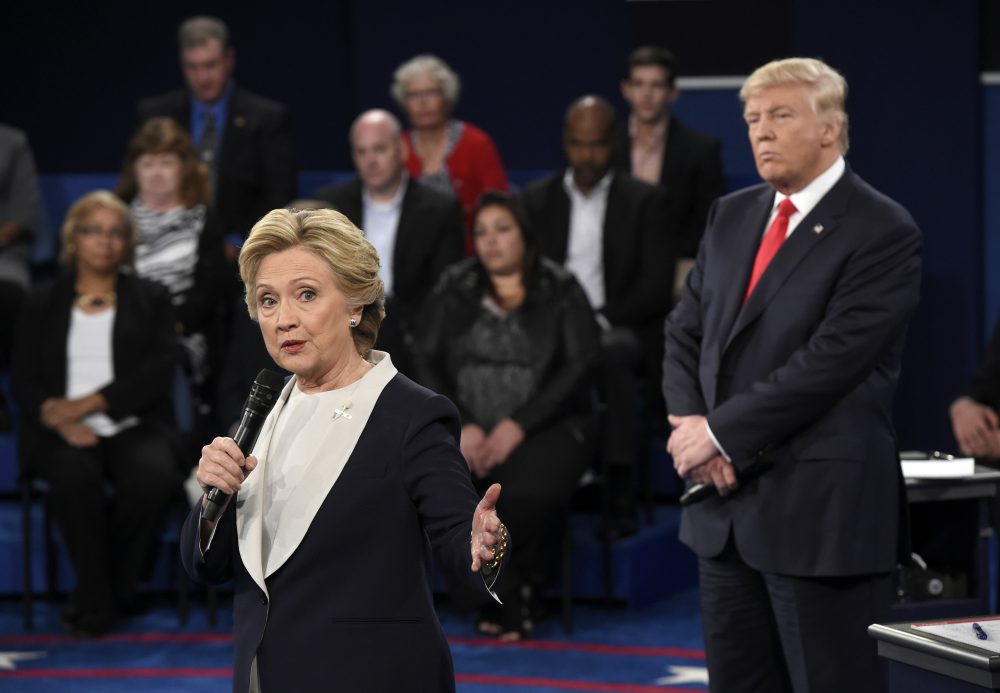Advertisement
What The Candidates Didn't Say About Nuclear Weapons

Our military has weathered its share of sexual misconduct scandals in recent years, so it doesn’t need a predator or misogynist as commander-in-chief. That Donald Trump’s decade-old boast of rampant sexual advances on women came up during Sunday’s debate was no surprise (he dismissed his claims as fiction, just "locker room talk" for which "I'm very embarrassed"). If the video containing his piggishness sticks a final fork in this turkey of a candidacy, good.
Still, the fact that The Donald could singlehandedly exhaust whatever sex therapy budget the Pentagon may have distracts us from a vital question facing the next president. It doesn't involve sex, just survival: Can the United States prune our bloated military spending and still protect against serious threats, from terrorism to cyber-attacks?
He (or, let’s hope, she) can indeed. Several defense experts suggest a place to start that didn’t come up in the debate: mothballing a Cold War relic, the long-range Intercontinental Ballistic Missile, or ICBM.
Suggest cuts in our stockpile and you terrify hawks who say you’re gambling with our security, yet the mere existence of these potentially planet-killing weapons terrifies us all.
Nuclear policy debates are a terrifying paradox. Suggest cuts in our stockpile and you terrify hawks who say you’re gambling with our security, yet the mere existence of these potentially planet-killing weapons terrifies us all. If we scrapped ICBMs, we’d still have missiles or nuclear warheads on submarines and bombers. But we’re talking big savings by losing the long-range land leg of the nuclear triad. A plan to modernize all three legs over the next three decades envisions spending $60 billion on 642 new ICBMs, defense journalist Fred Kaplan wrote in Foreign Affairs magazine.
During the Cold War, each leg had a justification. ICBMs were the most accurate for hitting Russia’s missile silos. Sea-based missiles were less precise but more survivable against the enemy, nestled on mobile, deep-diving subs. Bombers were slow in getting to a target, but that meant they could stand by for instructions under changing war circumstances, Kaplan wrote. Today, however, we have sub-based missiles accurate enough to take out missile silos, making ICBMs unnecessary.
Some military thinkers favor keeping ICBMs, Kaplan writes. They say land-based missiles could absorb much of a Russian first strike; without ICBMs, the Russians could easily target our bomber bases and sub ports, with enough Russian missiles left over to dissuade an American retaliatory strike. But even assuming a U.S. president would watch so many Americans die without firing back — a dubious assumption, in Kaplan’s view — we wouldn’t need the new ICBMs in the modernization plan. Keeping a handful of the existing ones to absorb a first strike would suffice, he says.
Beyond redundancy, ICBMs imperil global safety. “If our sensors indicate that enemy missiles are en route to the United States, the president would have to consider launching ICBMs before the enemy missiles could destroy them; once they are launched, they cannot be recalled,” former defense secretary William Perry says. “The president would have less than 30 minutes to make that terrible decision.”
An accidental launch is a remote possibility, Perry concedes — but not unthinkable He recalls a sleep-shattering phone call one night during his government service, as a general told him our defense computers had announced 200 Soviet missiles coming at us. “For one horrifying moment, I thought it was the end of civilization,” Perry says, only to be reassured by the general that the computers had malfunctioned and that no missiles were headed our way.
Hawks unnerved by a smaller nuclear arsenal should remember that at the height of the Cold War, we made do with fewer ICBMs than the generals and admirals wanted. Kaplan says that the Kennedy administration rebuffed the Joint Chiefs’ request for 10,000 of the things, permitting them just a 10th that many. Our total nuclear stockpile, hitting a high of 31,000-plus weapons in 1967, was down to roughly 19,000 by 1991; that number was halved during the 90s and halved again during the first decade of the 21st century — mainly because, Kaplan writes, the first President Bush and President Clinton handed over nuclear war planning to civilians in the Pentagon.
Beyond redundancy, ICBMs imperil global safety.
Of course, there are other ways to save on defense. Retired Army colonel and Boston University scholar Andrew Bacevich, writing in Foreign Affairs, says that if we trimmed the budget to outspend the next six biggest militaries in the world, rather than the current seven, we’d free up $40 billion a year. Bacevich would get the savings by reining in our Middle East involvement and getting Europe to shoulder more of its own defense (not via Trump’s immediate abrogation of our commitments but by a gradual, clearly telegraphed drawdown of our presence).
As for our quarreling candidates, Trump promises to audit the Pentagon for unnecessary bureaucracy and “incorrect payments” (whatever that means), but he wants to grow the number of forces and weapons. We needn’t tarry over that wrongheaded policy notion, nor his debate-night attack that a previous commander-in-chief, Bill Clinton, had been "abusive to women." There's ample proof that Hillary Clinton was right at the debate when she said Trump is unfit to lead the military and the nation.
She meanwhile pledges to keep us strong while “curbing runaway costs,” including in weapons acquisition.
Cutting ICBMs would be good place to start curbing.
